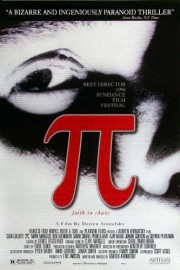Pi
Whether it’s the hallucinatory drug addictions of “Requiem for a Dream”; the love driven obsession of “The Fountain”; the redemption seeking main character of “The Wrestler; or the perfection a ballet dancer so yearns for in “Black Swan,” Darren Aronofsky has never strayed far from the themes of his 1998 debut, “Pi.” Those themes deal fundamentally with obsession, a life of repetition bordering on obsessive compulsive behavior, and the desire to achieve something that is ultimately beyond ourselves.
Maximillian Cohen (Sean Guillette) lives a solitary life. When he doesn’t eat at a local deli in Chinatown or play Go with his mentor (Mark Margolis), he is sitting in his one room apartment with his massive computer (obviously self-made) analyzing and obsessing over stock market prices. His goal is to find the numerical patterns in nature that could lead to a breakthrough in understanding the world. One day, his computer spits out a couple of truly unrealistic stock picks, as well as a number that may be around 216 digits long, before his computer fries. He throws away the results, but later finds out that the stock picks were correctly predicted. And what about that number? The rest of the film will deal with the drive to understand its meaning.
The main reason my mother (with whom I first saw the film in 1998) was not a fan of “Pi” whereas I was enthralled was that she saw it very much as a student film, and indeed Aronofsky is dealing with common first film cliches in “Pi.” The rough black-and-white cinematography of Matthew Libatique, who would later prove himself a master not only in Aronofsky’s other work but with Jon Favreau and others. The quick cuts and frequent montages Aronofsky uses to delve into Max’s broken psyche. The minimalist score by Clint Mansell, whose continued collaboration with Aronofsky (especially on their next film together, “Requiem for a Dream”) would result in some truly groundbreaking scores. And the themes of math and scientific thought leading to a larger understanding of the world are tried-and-true ideas in indie cinema, especially George Lucas’s landmark student short “THX-1138 4B” and the 1971 feature film he created based on it. Thirteen years later, I’m much more attuned and experienced to this level of micro-budget cinema (“Pi” only cost $60,000), but it doesn’t lessen my admiration for Aronofsky’s film, which continues to resonate with intelligent thrills that deal with personal issues of sanity and paranoia rather than mainstream thriller conventions.
Max is fundamentally troubled. He tells us in the inner monologue we hear throughout the film that one day, his mother told him not to look directly into the sun. So one day, he did. That is when the headaches began. Now in his 20s, he continues to deal with them, as well as frequent nosebleeds. All that ultimately matters to him is the study of numbers. But his mentor warns him against numerology; in that way lies madness. In that way the film would precede Joel Schumacher’s more mainstream “The Number 23” (with Jim Carrey), which took a conventional look at the ideas in “Pi” but without committing to the feelings the way Aronofsky did. Eventually in “Pi,” Max is confronted by two groups of individuals interested in his work: the first are Wall Street brokers who want his ability to predict the stock market; the second is a group of Hasidic Jews who are studying the Torah, and think that Max’s number might lead them to the Name of God.
Seen now, “Pi” remains a thrilling visual and intellectual experience; its technical specs are rough, but appropriate for the ideas being explored. But more than that, “Pi” remains a justly acclaimed curtain-raiser to one of the most extraordinary careers in modern cinema. His work isn’t for everybody, and not all of his films are easily rewatched (“Requiem for a Dream” in particular is a difficult experience), but Darren Aronofsky deserves mention with other filmmakers (Bergman, Tarkovsky and Kubrick) who used technical precision and unnerving intellect to explore tales of spiritual meaning and realization. I can’t wait to see what he has in store for us next.










